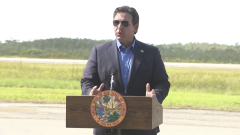Florida Governor Ron DeSantis has revealed that deportation flights have begun to depart from a remote detention facility known as Alligator Alcatraz, as the Republican leader seeks to put his state at the forefront of President Donald Trump’s immigration agenda.
Speaking from the south Florida site on Friday, DeSantis framed his efforts as a model for other states seeking to partner with the Department of Homeland Security (DHS).
“I’m pleased to report that those flights out of Alligator Alcatraz by DHS have begun,” DeSantis told reporters.
“ The reality is this provides an ability to enhance the mission, to increase the number and frequency of deportations. And so what’s been done here has really been remarkable.”
A representative for Immigration and Customs Enforcement (ICE), Garrett Ripa, also confirmed that “two or three removal flights” had already been conducted from the Alligator Alcatraz facility and that more were planned.
He indicated that those flights contained “ up to a hundred individuals who were illegally present in the state of Florida”.

Delegating resources
President Trump campaigned for re-election last November on the promise that he would undertake the “largest deportation operation in American history”.
But with more than 11 million undocumented people believed to be living in the United States, critics have pointed out that his ambitions may outstrip the amount of detention space and resources the government has available.
That has led the Trump administration to seek additional resources from state and local authorities, as well as assistance from foreign governments.
He has also deployed the military to assist in immigration enforcement operations, a task traditionally outside its scope.
Part of Trump’s toolkit has been deputising state and local leaders through Section 287(g) of the Immigration and Nationality Act.
While the federal government is solely responsible for immigration enforcement, Section 287(g) creates a loophole that allows ICE to enter into written agreements with state and local authorities to perform specific immigration-related functions.
Speaking alongside DeSantis on Friday, Larry Keefe, the head of Florida’s newly established State Board of Immigration Enforcement, said his team has already taken advantage of such arrangements.
“Just within the last couple of days, the federal government has issued credentials to over 1,200 Florida sheriff’s deputies and over 650 FDLE [Florida Department of Law Enforcement] agents and other state and local law enforcement agencies,” Keefe said.
“We have more than doubled our capability and capacity to effect arrests.”
Florida at the forefront
Florida, however, has been testing the limits of what it is able to do independently in terms of cracking down on undocumented immigration within its state lines.
Earlier this year, for instance, the Florida’s Republican-led government passed a law, known as SB 4-C (PDF), that imposes stiff criminal penalties on adult undocumented immigrants who knowingly enter the state.
But federal courts placed an injunction to prevent the law from taking effect, on the basis that it preempts the federal government’s authority over all things immigration.
Still, President Trump has haile





